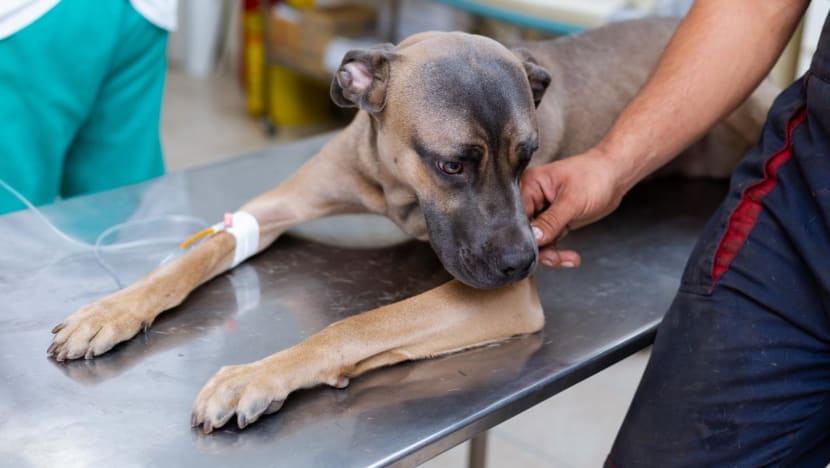Commentary: Exorbitant vet bills can force pet owners into heartbreaking decisions
As vet fees spike, it will be increasingly difficult for owners to give their pets the best quality of life, says Ricky Yeo of Action for Singapore Dogs.

While there is a growing number of licenced veterinarians in Singapore, the cost of vet care has been increasing steadily each year. (Photo: iStock/RobertPetrovic)

This audio is generated by an AI tool.
SINGAPORE: Only those who own a pet will understand the immense joy and love animals can bring to our lives. Unfortunately, their lives are much shorter than ours, even more so if they suffer from ailments.
A Singapore couple recently made headlines for spending S$60,000 to treat their French bulldog’s chronic illnesses, which ranged from skin allergies to an enlarged prostrate and a spinal disorder. Though the owners emptied their savings to pay the vet bills, the dog died at the age of four.
While there is a growing number of licenced veterinarians in Singapore, the cost of vet care has been increasing steadily each year. The vet bills for the dogs at our shelter go up by 10 per cent to 20 per cent every year, and have risen even more sharply in the post-COVID era due to inflation.
Common ailments like diarrhoea and vomiting can now set dog owners back anywhere from S$100 to S$500, while more complex but routine procedures like sterilisation can cost from S$400 to S$1,000.
This trend could be attributed to how vets structure their treatment. Back in the day, when I visited my family vet about my dog’s upset tummy, she prescribed anti-diarrhoea pills and instructed me to call if things aren’t resolved within a week.
Fast forward to today, in the same situation, the vet might order a battery of tests, scans and more medication than necessary to cover all bases. The sense I get when interacting with dog owners is that vets these days do not want to risk making a wrong decision.
Another trend is that vet clinics may not perform urgent or complicated procedures, and will refer owners to vet hospitals that are open 24/7 and have more sophisticated equipment. This may escalate the pet’s vet fees.
Case in point: We sent a dog with cancer to a vet hospital for emergency treatment after official hours. After 20 days of treatment, the bill came up to S$23,300. Such eye-watering costs would be difficult for most pet owners to afford.
NAVIGATING VET TREATMENTS AND COSTS
In the current landscape of vet treatments and costs, it is best to be prepared. Looking out for warning signs and seeking preventive treatment can significantly reduce vet expenditures.
Having a foundation of high-quality nutrition and supplements from a young age will ensure your pet’s immune system is strong. Be aware of genetic or breed-specific flaws and learn to observe for behavioural or biological signals that indicate all is not well. Schedule regular health checks during a pet’s old age to detect any onset of organ deterioration.
However, even with your best efforts, life will always throw curveballs. What if your pet develops serious ailments like cancer, organ failure or seizures?
If life-threatening symptoms surface, seek immediate medical attention to stabilise the condition and get a diagnosis. Ask about the treatment regime and ball-park costs.
Do some research so you can make the right decision for your pet. Get a second or third opinion from other experienced medical experts.
To weigh your options, ask yourself these questions: Is this the right treatment for my pet? What are the chances that they will recover? Will I be able to sustain a prolonged treatment plan?
If treatment proceeds, track treatment progress and costs closely at each stage. Vet bills have a way of creeping in and rising exponentially. Consider pairing natural or alternative treatment protocols which can help but are less costly.
You could also explore getting pet insurance. Currently a few insurance companies such as Income, Liberty and Etiqa offer plans in Singapore, but scrutinise the exclusions, especially pre-existing and genetic disorders, as well as the ceiling of payouts.
MORE TRANSPARENCY NEEDED ON COSTS
As pets have become part of our families, most owners will do whatever it takes to give them the best quality of life. But as the cost of vet care continues to spike, it will be increasingly difficult for pet owners to manage.
More transparency is needed on the cost of treatments to help owners make the best choices. There has to be oversight of the hospitals as to their costing of procedures and equipment. Processes have to be in place to track the quality of care provided, mortality rates and customer feedback.
It is welcome news that Singapore will set up a veterinary council by 2025 to address these critical concerns.
I have had clients who weighed the cost and probable outcome of treatment for their old pets, and made the heartbreaking decision not to proceed. The issue of unaffordable vet bills can become dire for pet owners, as well as animal welfare groups who have many animals under their care.
The issue needs to be tackled before it literally becomes a life-and-death situation. We are all that our pet has, and we hold their lives in our hands.
Ricky Yeo is President of animal welfare group Action For Singapore Dogs and an AVS-accredited dog trainer.
















